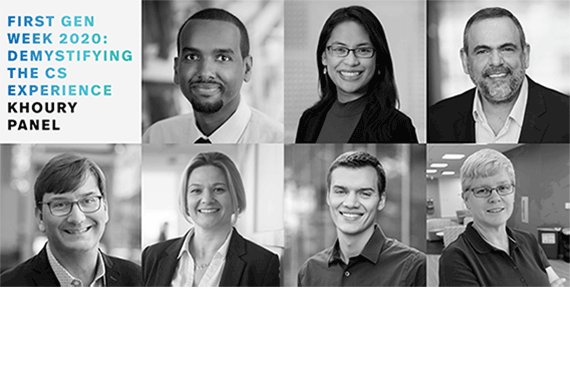Panelists share identity, advice, and community with first-generation Khoury students
Author: Valeria Vazquez
Date: 11.23.20

Top row (L to R): Anis Abdulle, Jackie Saarenas, Pete Manolios
Bottom (L to R): Ben Hescott, Bethany Edmunds, Connor Guerin, Maria Jump
“There were things I wish I knew before I went to college and during college, so I think this [panel] gives us a great opportunity to talk about those,” said Benjamin Hescott, associate dean of undergraduate education and experience and teaching professor at Khoury College. Hescott had also been a first-generation college student; therefore, he was fitting as moderator of Demystifying the CS Experience: A First Generation Panel, a November event at Khoury College.
The panel was one of the many virtual events during Northeastern’s First Gen Week, a week of programs to “amplify the proud voices and experiences of first-generation college students at the university,” according to the week’s website. Featured was a keynote address by Dr. Anthony Abraham Jack, author of The Privileged Poor, and award ceremonies to honor the accomplishments of the university’s first-generation students.
Demystifying the CS Experience featured a panel of Khoury College faculty and staff from across the network. Each of them detailed their own experiences as first-generation college students, or “first gen,” and provided advice to current first-generation Khoury students.
“One thing that was absolutely firm in my family was that education was the way to go, it was the only thing I was told to do” said Anis Abdulle, assistant co-op coordinator at Khoury who comes from a Somalian refugee family. “‘Graduate from high school, go to college,’ that is your mission.”
Many other panelists expressed similar sentiments, uniting a group of students who might at times feel unseen.
“Being a first-gen student is an invisible identity, so you think you are the only person going through this, but you’re not,” said Jackie Saarenas, director of West Coast Graduate Student Services. “Even just joining this group I had no idea that so many of my colleagues were also first gen, and it made me so happy, and so comfortable.”
As Saarenas pointed out, a big part of the first-generation student experience means finding other students that are first generation for support and community. The panelists proposed that another possible source of guidance may be a mentor.
“You can’t force someone to be a mentor, so you want a relationship that grows organically,” said Pete Manolios, a professor at Khoury College. “Be open to talking to people, communicating with them, taking advantage of the opportunities as they come up, and asking for help.”
Connor Guerin, a Khoury academic advisor, also wanted to lend advice for students who might be afraid to ask for help or ask questions.
“When I didn’t understand a word or something somebody said in college, I wouldn’t say it because I didn’t want to seem dumb,” said Guerin. “I wish I just asked a few more questions … I know as an advisor, who is first gen and was [then] low income, that I say acronyms to students by accident expecting for them to know. So it’s okay to ask, it’s okay to stop us as faculty and staff to find out those first steps to understanding all the little things about college that you can use to your benefit.”
The panel not only provided advice, but also shared experiences for current first-generation CS students to identify with. Many in attendance communicated that their experiences resonated with the panelists’, commenting in the Zoom chat.
“Your story is identical to mine,” typed Jovianne Bellegrade.
With very similar stories and many shared experiences, the panelists reminded first-gen CS students they are not alone, they have resources, and their goals are important.
“Having a goal is useful—when I went to grad school, I knew why I was there,” said Bethany Edmunds, director of computer science at Khoury/Vancouver and teaching professor. “Knowing that helped me frame the conversations I had with my advisors, to figure out what courses I wanted, because I knew where I was going.”
Maria Jump, an associate teaching professor at Khoury College, added to Edmunds’ advice and urged first-gen students to persist in their goals.
“There were many times during my PhD program where I thought I would leave,” said Jump. “Getting a PhD is stressful, there is no easy way to do that. Knowing why you’re doing it, and knowing that what you want to do is there and it’s reachable, is the main reason to do it.”